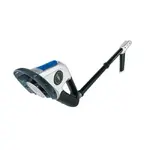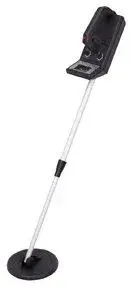Add this, too
Believe it or not, which detector to buy is only one of your issues. It is the most talked about, yet in my opinion, is the least of your worries. Most any detector from a major maker in the $200-$300 price range will give you years - yes, years - of fun, dependable service. I know that tends to kill the joy of endlessly wrangling over which is best, but is't fact.
Okay, so now that I've said it, let me back it up. Just WHAT are these other things you need to concern yourself with, if not a detector? Glad you asked! Here they are in list form.
This is the stuff you learn the hard way - or wish someone would have told you in the beginning. Now you dont have to wait for either.
Good Hunting, my friend.
"Dahut's Secret Tips to Success...for Newcomers"
1. Equipment is NOT the answer.
Ouch, that one hurts! The more crucial element in all this is MINDSET. We tend to be techno-dependent, expecting gadgets to do all things for us, right? Well, guess what? People were finding treasures before detectors came along. The difference is they knew what to look for and had some idea where to find it. You do the same. Do buy a quality detector, then consider it merely the means to an end. As I like to say, "Know Before You Go."
2. Dig, man dig!
You wont find anything if you don't and you won't learn what your machine is telling you, either. Your goal is to become an object recovery specialist, not a locating expert.
3. DO NOT rely on that meter or display.
There is a mountain of hype that claims this detector or that detector can tell "trash from treasure." DO NOT believe it - that stuff exists to sell detectors. There is A LOT of junk out there and much of it masquerades as good stuff. You will find trash and plenty of it, so develope a cavalier attitude to it early on. See, TIP #2 .
4. Turn that Sensitivity down!
Dont expect to find stuff halfway to China, as most good things are within the first FOOT, usually less.
That's the Good News.
Here's the Bad News: SENSITIVITY (gain) increases cannot "suck in" what isn't there to start with. Rather, gain that is set too high only results in false signals, erratic behavior, major frustration and can actually lessen your detectors performance.
5. Set time limits.
a. Plan to detect for a certain amount of time, as often as possible. Like any activity, good practice makes you better.
b. DO NOT detect longer that you should - set a limit on that, too. Remember you have a job and a family and friends.
6. Set Recovery Goals.
A certain coin or artifact, a certain number of coins/day, etc. Then work to achieve your goals.
Some say that this is "just a hobby and goals are for work." DO NOT believe that, either. That is minimalist crap. Achievement and success at anything is utterly dependent on your ability to push yourself beyond the simple things, past the easy frontiers.
7. Carry your detector with you as much as possible.
You never know when a chance to detect will come along. But dont leave it in your car, longterm - EVER!! We're talking about sensitive, costly electronic instruments here.The heat and jostling is murder on them and thieves know what they are worth, too.
8. Learn about your area and what you might actually find.
Do a little research about every possible place you might consider detecting, from the local park to vacant lots. It does no good to take your detector to a barren parking lot. I tried it once...I'm right, trust me on this one.
Here's an example, repeated all over the world. The park in my city was once an old home place, then a housing area through the 50's and now a modern park. The old coins and stuff are NOT where the modern play grounds are - and few know it but me. Get the point?
9. Talk to your friends and family about your new hobby.
Include the strangers you meet too, like folks in the checkout line or ban tellers. Ask if they know any old places, or good modern places, where lots of people have been active.
Make up some simple personal introduction cards on your computer, naming you as "Joe Schmoe, Detectorist." People respect credentials and being an ambassador of the hobby will open doors for you.
P.S. DO NOT call yourself a "treasure hunter." For many, the word 'treasure' evokes all sorts of images - some of them bad for your image. Dont get that started.
10. Plan to do all sorts of detecting.
You are new and this hobby has lots to offer. Dont imagine yourself only "this sort" of detectorist or "that sort." Try it all.
11. Learn the Detectorists Code of Ethics.
And practice good recovery techniques, ALL THE TIME. Few things will sour you on this hobby like being ticketed for leaving holes behind you or getting busted on private property. I learned this last one the hard way, at the wrong end of a shotgun - don't repeat my mistake
12. Get a durable carry bag at the thrift store and keep these things in it:
+ Extra headphones - A broken set of phones will ruin any hunt. Folding digiphones are perfect for this.
+ Extra batteries for your unit(s)- Likewise, a set of dead batteries is a real fun-buster.
+ 2 Digging Trowels - NOT the crap from WalMart's garden section, either. Get strong purpose built tools.
+ An inexpensive sand sifting scoop. There are an amazing number of easy-digging sandy spots to hunt. You'll thank me for suggesting this one.
+ 1 recovery apron - Most home centers sell nail aprons for a $1. They'll do.
+ 1 10" probe - I make mine from a 3/16" piece of brazing rod and a section of old broom handle. Use this to probe for coins beneath the turf.
+ 1 10" long screwdriver - for "popping" the coins you probe from the turf.
+ 1 8-10", solid-tang hunting knife - Just plain useful. Cuts roots, plugs in grass, etc.
+ Garden gloves - ones you can manage dextrous work in.
+ Super glue and duct tape - you don't need this explained, right?
...You can have more but you'll need these things, sooner or later.
BONUS TIP #13: Determine to Have Fun!
copyright, DDH/Dahut, 2006






